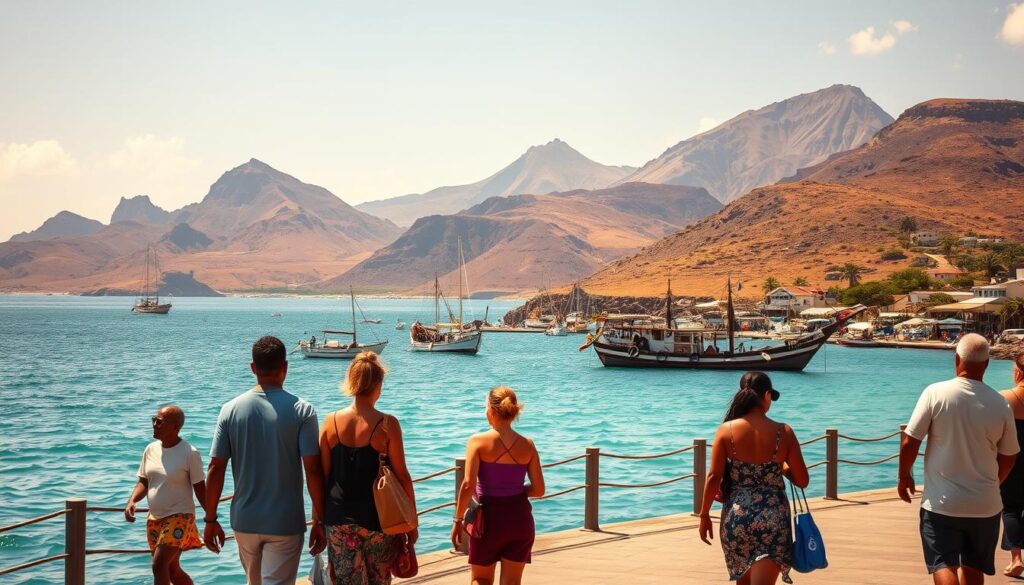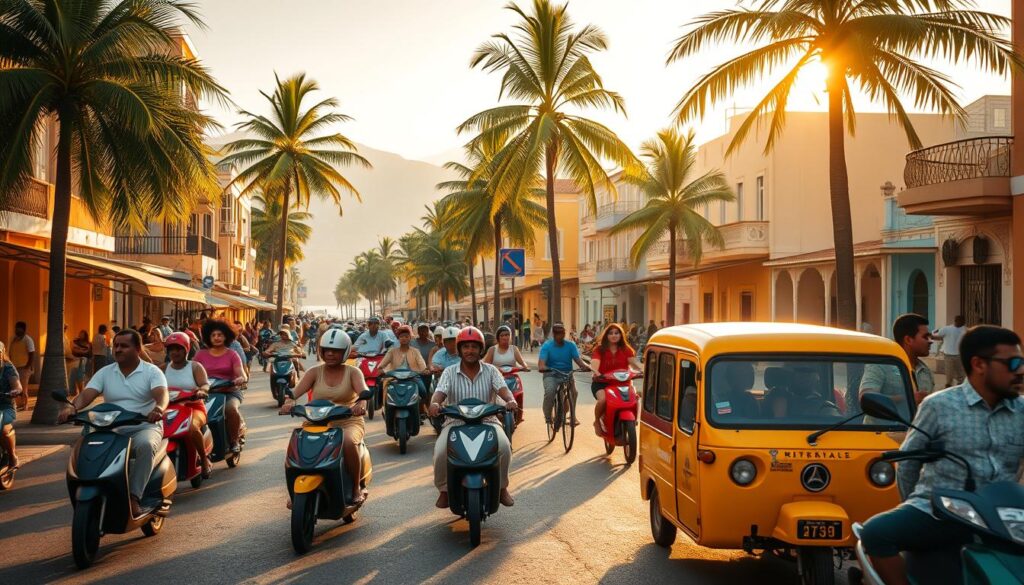Picture yourself standing atop a volcanic ridge at sunset, salty ocean winds tousling your hair as live morna music drifts from a nearby village. Below lies a crescent-shaped beach glowing like molten gold, while above, stars begin piercing the twilight – no crowds, no neon signs, just raw natural wonder. This isn’t a fantasy. It’s Tuesday in Cape Verde.
Six hours from the East Coast lies an archipelago where African rhythms meet Portuguese charm. Ten islands rise from the Atlantic, each sculpted by volcanoes and centuries of cultural fusion. Forget cookie-cutter resorts – here, you’ll hike lunar-like craters at dawn and dance with locals to funaná beats by dusk.
What makes these islands extraordinary? Diversity. One day you’re stargazing in Sahara-like dunes on Boa Vista. The next, you’re sipping grogue rum in Santo Antão’s misty peaks. Unlike crowded Caribbean hotspots, you’ll find authentic encounters – fishermen mending nets in Mindelo’s harbor, grandmothers sharing cachupa stew recipes, trails where your footprints might be the day’s only marks.
Key Takeaways
- Ten distinct volcanic islands offer landscapes ranging from desert dunes to lush green peaks
- Cultural experiences blend West African traditions with Portuguese colonial influences
- Adventure opportunities surpass typical beach vacations, including volcano hikes and wind sports
- Shorter flights from the U.S. compared to Caribbean destinations with minimal time difference
- Authentic local interactions away from mass tourism crowds
Introduction to Cape Verde’s Diverse Island Experiences
Discover an archipelago where West African drumbeats echo through Portuguese cobblestone streets – welcome to Cabo Verde. Ten volcanic islands rise from the Atlantic like nature’s sculpture garden, each offering distinct adventures. As one local fisherman in Praia told me: “Here, every cove has its own heartbeat.”
Where Fire Meets the Sea
The islands’ volcanic origins create jaw-dropping contrasts. Santiago – the largest island – mixes rugged peaks with the capital’s bustling markets. Head west to Santo Antão, where green valleys plunge into the ocean. Or chase Saharan sands on Boa Vista’s wind-sculpted dunes.
A Cultural Tapestry Unfolds
Portuguese colonial architecture stands beside colorful Cabo Verdean fishing villages. The morna music drifting through Mindelo’s streets tells stories of resilience and joy. Don’t miss the Creole language – a living bridge between continents that you’ll hear in market banter and funaná lyrics.
Winter travelers find perfect 75°F days for hiking Pico do Fogo’s active volcano. Summer brings festivals where entire islands become dance floors. As one musician grinned while tuning his cavaquinho: “Our rhythm warms you faster than our sun.”
Detailed Daily Itinerary for Cape Verde Exploration

Crafting your Cabo Verde adventure requires balancing discovery with relaxation. Let’s design days that transform island gems into lifelong memories – without rushing or missing key experiences.
Sample Daily Plans for Adventurers
Morning light on Sal island reveals three must-do adventures. Start at Pedra do Lume’s salt pans – float effortlessly in mineral-rich waters by 9 AM before crowds arrive. By noon, join conservationists at Shark Bay to observe juvenile lemon sharks in knee-deep shallows.
| Tour Type | Highlights | Duration | Pro Tip |
|---|---|---|---|
| Half-Day | Blue Eye cave, Shark Bay, salt pans | 4 hours | Book Union Tour for groups under 8 |
| Full-Day | Adds Murdeira Bay, Kite Beach, Terra Boa desert | 8 hours | Pack swimwear & hiking shoes |
Time Allocation & Must-Do Activities
Santa Maria serves as your base – allocate evenings to its vibrant beachfront fish markets. Schedule water activities before 11 AM when Atlantic winds strengthen. Local guides suggest:
- Salt pans visit: Early morning for calm conditions
- Shark encounters: Two hours before high tide
- Blue Eye exploration: Midday sunlight reveals cave colors
Leave afternoons flexible for spontaneous things – like joining fishermen’s grogue rum tastings or chasing sunsets at Ponta Preta’s dunes. As one tour operator advised: “Plan three activities daily – the islands will gift you a fourth.”
Practical Travel Tips for a Stress-Free Voyage

Navigating this archipelago requires equal parts preparation and spontaneity. Local wisdom whispers: “The islands reward those who dance with their rhythm.” Here’s how to move smoothly between volcanic peaks and sun-kissed shores while keeping your adventure on track.
Local Transportation & Navigation
Island-hopping here isn’t for rigid planners. Ferries cancel when Atlantic winds roar – but the Mindelo-Porto Novo route proves most reliable. For land travel, embrace aluguers (shared taxis) that burst with local chatter and reggae beats. Rent wheels on Santiago or Santo Antão for cliffside drives, but switch to 4WD when chasing hidden waterfalls or black-sand beaches.
Packing Essentials & On-the-Ground Advice
Your luggage needs three warriors: reef-safe sunscreen for relentless winter sun, grippy shoes for lava-rock trails, and a light jacket for starlit dinners. Carry both euros and verdean escudo – ATMs in Santa Maria often take unscheduled holidays. Budget like a pro: CVE300 buys hearty cachupa stew, while CVE2500 covers fresh lobster feasts.
Book tours locally for last-minute deals. As a Sal taxi driver advised: “Reserve your bed, then let the islands write your itinerary.” Leave space for spontaneous music sessions on Mindelo docks or impromptu hikes to sunrise viewpoints. This isn’t just a trip – it’s your backstage pass to island life.
Discover the cape verde holiday destination: Insider Tips and Local Insights

Ever tasted freshly caught eel while fishermen mend nets beside you? This archipelago thrives on moments where visitors become temporary neighbors. To unlock its soul, swap tourist checklists for local rhythms – the real magic happens when you lean into the islands’ easygoing pulse.
How to Make the Most of Your Trip
Mindelo’s cobblestone streets hum with morna music after sunset. Start at Café Lisboa for cachupa stew, then follow guitar strains to Quintal da Música. For daytime adventures, Santa Maria’s fishing pier offers front-row seats to daily life. Watch crews unload fish at dawn, then join them for coffee at Barracuda Café.
| Experience | Location | Best Time | Local Tip |
|---|---|---|---|
| Live Music | Mindelo | After 9 PM | Ask about “batuque” drum circles |
| Market Visits | Santa Maria | Early Morning | Bring small escudo bills |
| Hidden Eateries | Near Hotel Odjo d’água | Lunch Hours | Try Cham’s fried eel |
Connecting with Local Communities
Locals here share stories like they’re offering salt – freely and with pride. When craft sellers approach, smile and ask about their designs. You’ll often get history lessons instead of sales pitches. Join morning tours led by fishermen-turned-guides in Boa Vista – their ocean wisdom transforms simple boat rides into cultural exchanges.
For authentic meals, wander two blocks inland from Santa Maria’s beachfront. Family-run spots like Taberna Belém serve Cabo Verdean staples at half the tourist prices. As one chef told me while grilling tuna: “We feed you like cousins, not customers.”
Island Selection Guide for Your Perfect Cabo Verde Getaway
Choosing your ideal Cabo Verde escape feels like picking flavors at an artisanal gelato shop – each island offers distinct delights. Will you chase desert winds or misty peaks? Dance to coastal beats or savor cliffside serenity? Let’s decode three gems shaping unforgettable journeys.
Coastal Charms vs Mountain Majesty
Sal delivers endless white sand beaches and kitesurfing thrills. Its lunar salt flats contrast with Santa Maria’s vibrant fish markets. Boa Vista stuns with Sahara-like dunes meeting turquoise waters – perfect for solitude seekers. For green valleys and cobblestone villages, Santo Antão’s hiking trails weave through banana groves and cloud-kissed peaks.
Tailoring Your Island Experience
Match your pace to the landscape. Beach lovers thrive on Sal’s resort comforts and Boa Vista’s secluded coves. Adventurers gravitate to Santo Antão’s rugged paths and farm-fresh meals in mountain restaurants. Mix two islands for diversity – pair Sal’s watersports with São Vicente’s live music scene.
Pack light layers and an open mind. Whether you crave sunrise yoga on untouched sand or sunset grogue cocktails overlooking volcanic cliffs, these volcanic islands transform “where to go” into “how soon can I return?”
FAQ
Q: What’s the best time to explore Cabo Verde’s volcanic islands?
A: Visit between November and June for dry skies and warm temperatures—ideal for hiking Santo Antão’s trails or lounging on Boa Vista’s white sand beaches. Avoid August’s rainy season if you’re chasing winter sun.
Q: How do I island-hop between São Vicente and Santiago?
A: Domestic flights via Binter Cabo Verde connect major islands quickly, while ferries like CV Interilhas offer scenic coastal routes. Book ahead during peak seasons to secure your spot.
Q: Can I experience local culture beyond Santa Maria’s resorts?
A: Absolutely! Dive into Mindelo’s live música scenes on São Vicente, join a traditional fishing trip in Tarrafal, or savor cachupa stew at a family-run restaurant. Festivals like Gamboa in May showcase the archipelago’s Afro-Portuguese soul.
Q: Is Cabo Verde budget-friendly for independent travelers?
A: While beach resorts lean toward luxury, local guesthouses and street food (think pastel com diablo) keep costs low. Budget around 50–70 euros daily for meals, transport, and activities—more if staying in high-end hotels.
Q: Are the salt pans of Sal worth a day trip?
A: Yes! Pedra de Lume’s lunar-like salt flats, set in an extinct volcano crater, offer surreal swims in mineral-rich waters. Pair it with a visit to Terra Boa’s desert mirage for a full-day adventure.
Q: What essentials should I pack for Boa Vista’s desert climate?
A: Bring reef-safe sunscreen, a wide-brimmed hat, and lightweight layers for windy dunes. Sturdy sandals handle both Santa Maria’s beaches and rocky coastal hikes. Don’t forget a reusable water bottle—tap water isn’t drinkable here.
Q: How safe is it to explore Cabo Verde’s towns after dark?
A: Most areas like Praia and Mindelo are safe, but stick to well-lit streets and avoid isolated spots. Locals are welcoming, though petty theft can occur in crowded markets—keep valuables secure.
Q: Which hidden gems rival Sal’s tourist hotspots?
A: A> Santo Antão’s ribeiras (valleys) burst with papaya groves and cliffside villages. On Fogo, hike Pico do Fogo volcano and sip volcanic wine in Chã das Caldeiras. São Nicolau’s Monte Gordo National Park offers untouched trails rarely seen by outsiders.
- Madeira Travel Guide 2026: Top Things to Do, Best Itineraries & Insider Tips
- Tinajani Canyon Peru: Ultimate Travel Guide to the Valley of Stone Giants, Elevation, Trails & FAQs
- Isla Suasi: The Complete Guide to Peru’s Private Lake Titicaca Island
- Ikara-Flinders Ranges — Complete Travel Guide for 2026
- Phillip Island, Victoria: Ultimate Travel Guide (Wildlife, Best Time to Visit & Insider Tips)

